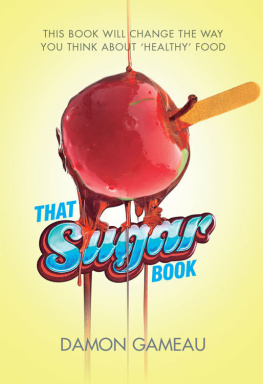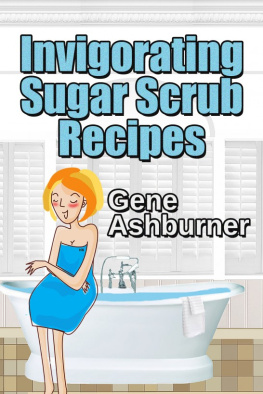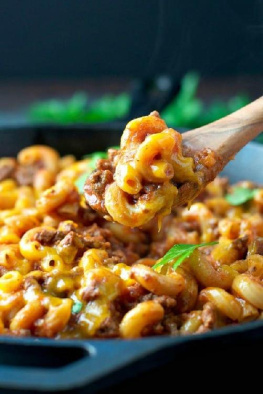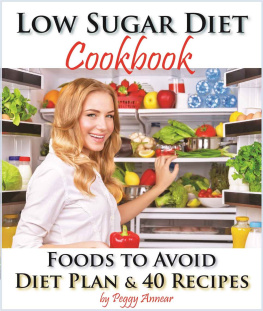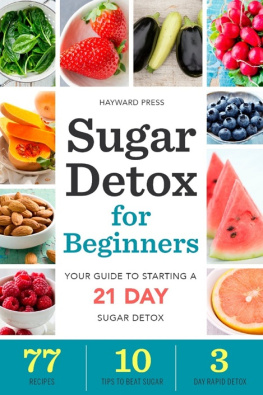


FOREWORD
BY DAVID GILLESPIE
Ten years ago I lost 40 kilograms by doing just one thing: I stopped eating sugar. I did it because the research I was reading led me to the undeniable conclusion that my sugar consumption was keeping me fat. But I didnt stop reading when the weight started coming off. I discovered more and more research on the damage being caused by sugar.
Sure, sugar was keeping me fat. But that was the least of its charms. The research was clear: sugar also destroys our teeth, our gut lining, our liver, our pancreas, our kidneys and our heart. And the damage didnt stop there; it was increasingly clear that sugar could destroy our state of mind as well. The research tells us that consuming sugar, even in moderation (a phrase invented by the food industry to give you licence to eat as much as you like), is likely to be the cause of the modern epidemic of anxiety and depression.
As I was trying to fit into a smaller pair of jeans, Damon was independently figuring out that he was a better person off sugar. He was, and is, a fit and healthy young man, so he wasnt looking to sugar as a weight loss tool. But he was curious and interested in how sugar affected his moods. So he decided to see if reducing sugar made any difference.
He dropped the white stuff and almost immediately experienced a dramatically improved sense of wellbeing. But was it the sugar? Or just coincidence? Damon was in a very good place in his life at the time. He was (and is) immersed in a happy relationship, looking forward to the birth of a delightful heir and was starting to hit some home runs in his career as well. His acting career was flourishing and his first film as a director had just run away with an against-the-odds win at Tropfest in 2011.
How much of his improved sense of wellbeing was because he removed as much sugar as he could from his diet? Or, was it down to the fact he was in a good place anyway? Was it the chicken or the (Easter) egg that came first?
At some point, Damon heard me talking about sugar consumption and health on the radio. He asked if we could meet. I am not a creative person by nature, and have not met many professional actors (well, none, unless you count politicians), but was I in for a treat. Damon was an earnest blur of energy and ideas. He wanted to find out whether the absence of sugar could take the credit for how he felt. He wanted to do an experiment on himself. He wanted to eat the Australian daily average sugar consumption for two straight months and see what happened. And he wanted to film it. Oh, and he wanted the subsequent movie to make a glorious and spectacular impression, no matter what the result.
I told him he was a sandwich short of a picnic. If even half of the research Id read was true, he was likely putting himself at risk of significant harm. He reckoned there was a good chance I was right (about the harm not the sandwich!) but, he reasoned, what better way to find out? And if I was right, what better way to show millions of people? As I was soon to discover in spades, when Damon has a plan, your choices are follow (and enjoy the ride) or get out of the way. I chose to follow.
Damon took a risk for us all. He did it for you, your kids, those you hold dear. And, like most curious people, he did not think of the consequences. And there were consequences, not just for Damon, but for his, by then, pregnant partner Zoe (whose strong and unwavering support underpins every frame).
What you have in your hands is the story of a man who wanted to answer a question for himself, fully aware that it would help others. Damon stepped up. He couldnt help himself. What he has proven in real time, with the cameras rolling, would never get research approval (I warned him of that). But his careful, intelligent planning means that you now know the devastating effect sugar will have on you is having on you. The people creating your food, providing your food, creating health policy about your food, have nowhere left to hide in the face of such compelling evidence.
Damon (an ordinary, extraordinary bloke) and his family have taught me a lot, and I have gained a friend on the way. Hes a humble, practical, wicked fella who just wants you to know the truth. Read on and prepare to be inspired.
DAVID GILLESPIE HAS AUTHORED NUMEROUS BOOKS, INCLUDING
THE BEST-SELLING SWEET POISON BOOKS ON THE DANGERS OF SUGAR.
INTRODUCTION
Apart from climate change, or perhaps who the best One Direction singer is, there is not a more fiercely debated, opinionated or instagrammed topic on the planet than nutrition. Trying to find answers, especially if youre looking online, can feel like youre wading through a mass of confusion and contradictions fuelled by inscrutable scientific data, dogmatic culinary gurus and pages of vitriolic comment. It is now unclear whether bread is a friend or an enemy; dairy is scary but butter is better; and what about feta? Some foods have even stepped into some kind of nutritional phone-booth and emerged as super foods.
Be it health advocates, the media, food bloggers, friends it seems everyone has a different opinion on what we should and should not eat.
Amid all the debate though, there is one ingredient that seems to be the current darling of the nutritional paparazzi: sugar.
Over the past few years, sugar has dominated the headlines, with plenty of speculation and bickering over its effects on our health. I felt quite ambivalent about it until two blue lines appeared on my better halfs pregnancy test. The topic then seemed to rocket in importance so I decided I better bypass opinion and find out for myself.
We can read all we like about a subject but in the end all we ever have is our own experience. This book is about sharing my sugar experience.
60 DAYS, 40 TEASPOONS
For 60 days I would test out a high-sugar diet by consuming 40 teaspoons of sugar a day. Youre a lunatic! I hear you cry but the scary fact is that 40 teaspoons of sugar is what many Australians are consuming every day (with Britons consuming on average 34 teaspoons a day), and teenagers are having even more.
There would be a twist, however. Unlike the average teenager, I would only eat perceived healthy foods foods generally believed to be low in, or free from, sugar. This meant I had to reach my 40 teaspoons a day without soft drink, chocolate, ice-cream or confectionery. Instead, my diet would be made up of foods like low-fat yoghurt, cereals, muesli bars, juices and sports drinks: all of which are full of hidden sugars.
During the experiment I was monitored by a team of doctors and scientists. I also embarked on a sugar-fuelled adventure across Australia and the USA, filming the whole thing for a feature documentary film. I met some wonderful characters, interviewed the worlds leading experts on sugar, watched my mind and body change and learnt more about this little white substance than I ever thought I would.
This book is divided into four parts. For those of you who like a good story (or a bad one depending on your taste), the first section follows the ups and downs of my sugar-eating lunacy. The second part is all about the science: the facts come complete with pretty pictures to help explain what sugar did to my mind and body. The third part describes how I successfully removed sugar from my diet. It also provides some simple assistance for those who may also want to reduce their sugar intake and live a healthier life. The fourth part includes an all access pass to recipes that helped me during the post-experiment detox.
Next page
